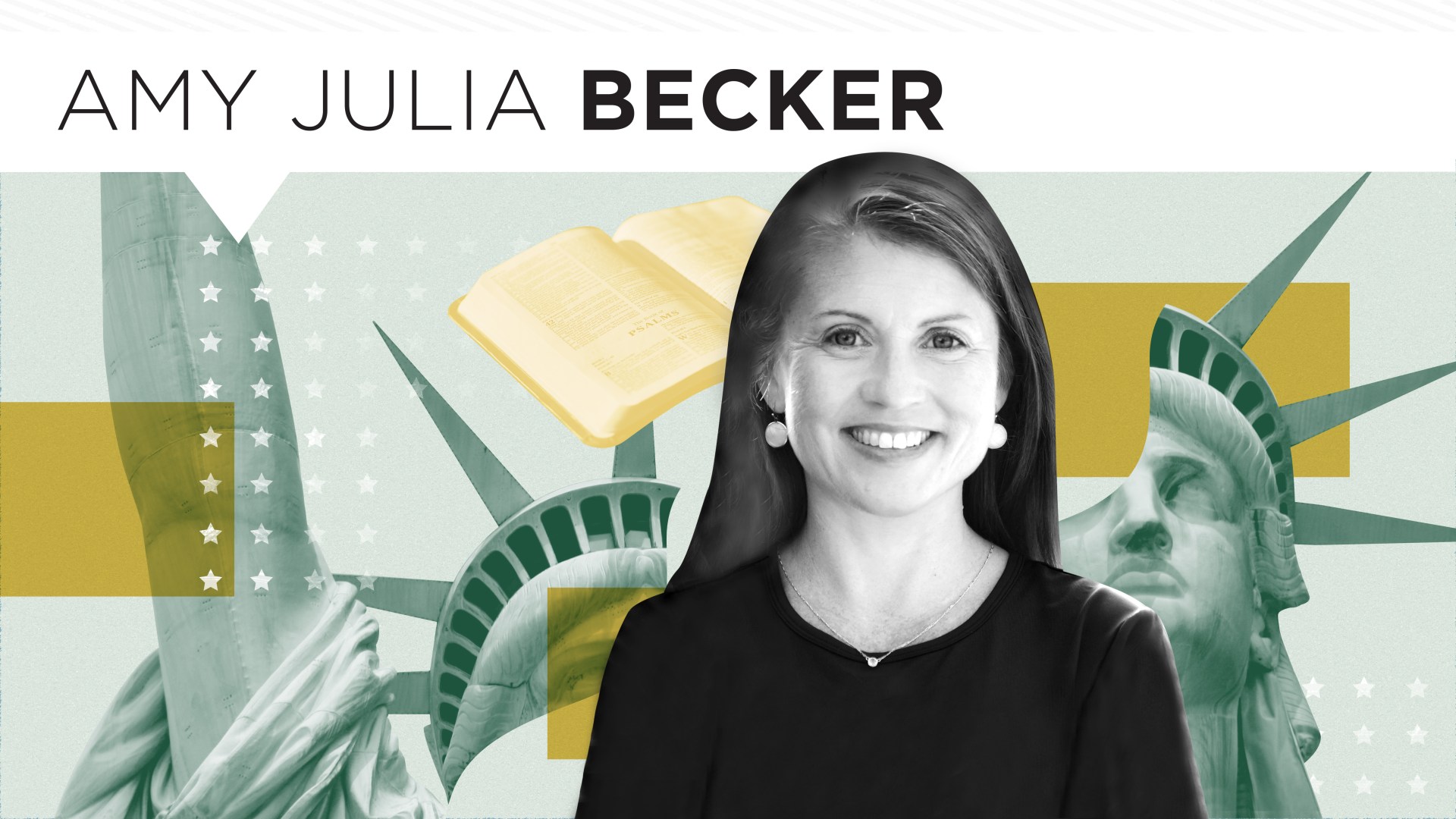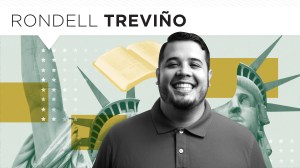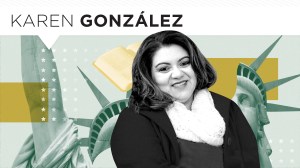In this series
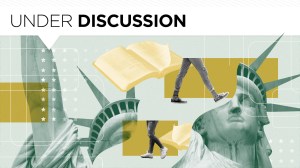
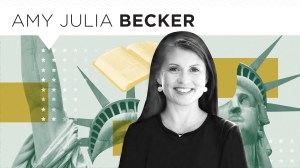
Christianity Today asked a group of contributors how, if at all, the Bible should inform what a nation expects of immigrants. This is one of five essays in the series.
Last September, I traveled with a small group of evangelical women to El Paso, Texas, and Juárez, Mexico. We were hosted by Welcome, a collaboration between World Relief and the National Immigration Forum that offers an intellectual, theological, and personal understanding of the humanitarian crisis on our southern border. We met with local pastors and nonprofit leaders who have been providing shelter and care for migrants from Guatemala, El Salvador, and Honduras. We visited one of the shelters in Juárez that houses some of these migrants. We spoke with an immigration policy expert. We spent time with three border patrol agents to better understand the daily pressures they face protecting the border and caring for people in need.
When I was in El Paso, I heard a refrain: There is not enough. Not enough border patrol agents to process the migrants. Not enough detention facilities. Not enough judges. Not enough lawyers. Not enough discussion about changing the laws regarding legal entry and paths to citizenship. Not enough resources to house and clothe and feed and educate so many vulnerable people.
Certainly, the people and organizations at the border need more resources if they are going to care for immigrants in a humane way that honors the image of God. At the same time, citizens express their concern that the US is not prosperous enough to take on more people. We hear politicians say immigrants will overburden our social welfare systems.
So we become convinced that there is not enough. Not enough to care for immigrants at the border. Not enough to let them in.
But I follow a God who says there is always enough. Many of the women and men and children fleeing their home countries share my faith in Jesus. How can it be true that “God will meet all your needs” (Phil. 4:19) for them? How can it be true that they need not worry, for tomorrow “will take care of itself” (Matt. 6:34, CEV)?
When I was in El Paso, I kept thinking back to a simple incident with our three children. We were invited to a pool party, and our three kids knew that the supply of swimming goggles had dwindled to two desirable pairs. The older two quickly claimed the goggles, leaving Marilee, our 8-year old, with nothing. I threatened that no one would be able to swim if they couldn’t figure out a better solution. At that point Penny, our eldest, huffed, “Fine. I just won’t go swimming.”
My children could only see their situation through the lens of scarcity, and the only “solution” was total relinquishment, utter self-sacrifice, no swimming at all. Not one of them could come up with the idea of sharing the goggles.
Like my children, we have manufactured an impossible choice: Hoard what we have or give it all to the women, men, and children who are destitute and vulnerable. That is the way fear, scarcity, and isolation work. But that’s not the way abundance works. That’s not the way sharing works. That’s not the way God works.
The COVID-19 pandemic has only increased our sense of scarcity. There’s scarcity of simple resources like toilet paper and antibacterial soap. Scarcity of jobs. Scarcity of medical care. But even now, Christians are called to believe in the ongoing story of God’s abundant love for all people and God’s invitation to extend that abundant love even if it comes at a cost. The cost will not outweigh God’s provision. We hand to Jesus what “belongs” to us, with no guarantee that it will come back to us. But then we experience the miraculous reality that when we human beings decide to share, not only is there enough, but those acts of generosity spark human connection, gratitude, and joy.
Practically speaking, we are in a position to extend hospitality to our southern neighbors who are seeking refuge. The economic data about the role immigrants play, the economic data about our consumer spending habits, and a Christian ethos of abundance and generosity all challenge the idea that this immigration crisis threatens our country’s stability and that we should keep our borders closed. On an economic level, many sources, including the National Immigration Forum, report that immigrants in general contribute more dollars to the overall economy of the United States than they receive from it in social services. According to the Institute on Taxation and Economic Policy, undocumented immigrants pay over $11 billion in taxes each year, far more than they “take” from the system.
Moreover, until a few months ago, Americans lived in an era of low unemployment and of consistent (albeit slow) economic growth. Even today, by any economic measure, the United States is one of the wealthiest countries in the world. According to the Bureau of Labor Statistics, in 2018 we spent an average of $3,200 per person on entertainment (by contrast, we made “cash contributions,” which often indicates charitable giving, of $1,888 per person). We have heard a story of scarcity in recent years, but we would do well to remember an older American narrative. We live in a land of plenty, a land of opportunity, and immigrants only make it more so once they are safely settled among us.
To remedy the ongoing crisis on our southern border will require generosity, and such generosity could come at a cost, whether through voluntary charitable giving by individuals or increased spending on humanitarian resources. If there’s anything “staying at home” has taught me in recent months, it is that I can live without many of the events and upgrades that once seemed necessary.
For every American, there are economic, political, humanitarian, and ideological reasons to “share the goggles,” to welcome the asylum-seekers, to provide more funding for border patrol, more funding for immigration judges, and to change the laws and policies governing visas and paths to citizenship within this country. But Christians in particular have reasons to welcome those from foreign lands to our own shores.
Christians rely upon an ancient set of stories about a God of abundance who prompts his people to trust in his provision and generosity. In Exodus, we encounter the story of manna in the desert, when God regularly and miraculously provides food for his people for 40 years. The Israelites repeatedly experience situations in which there is not enough—not enough men to fight, not enough food to eat, not enough faith to endure—and God provides. Jesus similarly calls his followers to live with radical generosity as they trust a God of abundant provision. All four gospels record the feeding of the 5,000. This miracle happened only because a young boy volunteered to share his scanty resources with an overwhelming crowd. That boy then had a front-row seat to the abundance God provided through him.
Modern day examples of God’s abundance appear in stories like Gregory Boyle’s testimony of how “boundless compassion” can transform former gang members in Los Angeles, Kathy Izard’s story of provision in the face of a crisis of homelessness in Charlotte, North Carolina, Henri Nouwen’s witness to abundance in community with people with intellectual disabilities, and John Perkins’ recounting of the presence of God’s abundant love in confronting racism and injustice.
For God’s people to experience God’s abundant provision, we must begin with trust in God, which in turn enables us to entrust our time, energy, and resources to others.
We must take practical steps when it comes to public policy, funding, and long-term changes to our immigration system to both protect current Americans and welcome those in need. Christians who are US citizens have a unique opportunity to leverage that privileged position to shape a more just society for people of every ethnicity, class, and immigration status.
The narrative of abundance can seem unreasonably idealistic in the face of thousands and thousands of people in need. But we can translate an idealistic vision of abundance into a concrete willingness to change the way we consume goods and spend money. We can translate it into phone calls and letters to our elected officials. We can translate it into prayer for eyes to see and hearts to respond to need in the world. We can translate it into action that reflects the love of Christ. Indeed, the idealistic vision of God’s abundant love that cries out to us from the pages of Scripture—Love always trust, always hopes, always perseveres—will remain idealism unless God’s people, by God’s power, put that abundant love into action.
Amy Julia Becker is the author of White Picket Fences: Turning toward Love in a World Divided by Privilege, among other books. She lives in western Connecticut with her husband and three children.

